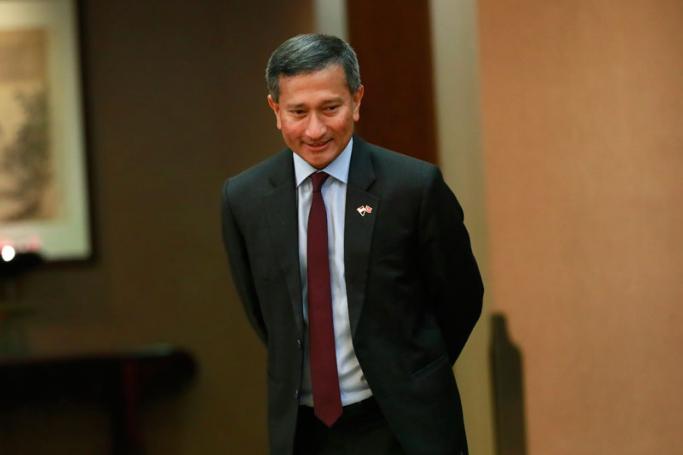Mizzima correspondent Hong Sar met with Singaporean Foreign Minister Vivian Balakrishnan and asked him his view on what ASEAN can do to address Myanmar’s Rakhine crisis.
As you know, there is a crisis in Rakhine State. In your speech at the UN General Assembly you talked a lot about how ASEAN had to be cooperate with Myanmar State Counsellor Aung San Suu Kyi. So, what can ASEAN countries do to solve this problem in your view?
Well, a tough but relevant question given current events. I think the first thing I want to say is that this is Myanmar’s responsibility to resolve. All of us, in our own – I’m talking about all of the other individual Member States of ASEAN – all of us have had to deal with this very challenging issue of race, language, religion and citizenship in our history. All of us have had to deal with it and resolve it in our own unique ways. So that’s the first point. This is Myanmar’s responsibility and you have to resolve it.
Second point is: I will recognise however, that this is a complicated, long-standing issue, and it’s not easy to just negotiate, come up with a statement and say everything is fine. It is complicated, it is difficult. From an ASEAN perspective, what we all hope for is that the violence stops.
Never mind the details about history and politics, there is real suffering, there is real loss of life, I’ve seen the photos which the Myanmar Army has shown me. As a doctor, as a surgeon, I can tell you the cause of death, I cannot tell you who did it or why innocent people have to die, and suffer, and be displaced. So, our first humanitarian response, regardless of politics, surely must be that the violence must stop.
The second is for people who are already displaced, for people that are already suffering, we must ensure that humanitarian assistance is provided. And it is only right and proper that ASEAN delivers humanitarian assistance to all the affected communities who need help. So that’s why you see our focus in the last few months has been to mobilise the ASEAN Coordinating Centre for Humanitarian Assistance on Disaster Management, and to deliver real assistance to the internally displaced people of all communities, both within Myanmar as well as those who have crossed the border to Bangladesh.
The next thing we hope for, and you know I just came back from Myanmar - obviously I met Daw Aung San Suu Kyi, I also met Commander-in-Chief of Defence Services Senior General Min Aung Hlaing. I also met the Foreign Minister of Bangladesh. We hope that ongoing dialogue and some agreements can be settled between Myanmar and Bangladesh in order to help people who have been displaced, and in order to provide for voluntary, dignified and safe repatriation.
Now, there are many, many details that need to be sorted out. Again, I would say that it’s for Myanmar to resolve, and for Myanmar to have a dialogue, an effective dialogue and agreement with Bangladesh. Beyond the urgent and humanitarian response, in the long-term, the way we believe, to deal with issues - very difficult issues of race, language and religion - is to have a fair and just society, and to have opportunities for progress for everyone. And one of those key things for progress has to be economic progress, in particular jobs, infrastructure, and the ability to access the global economic system. These are longer term but no less important in order to provide security, economic progress, and hope for all communities. Otherwise, Southeast Asia will be vulnerable to extremists and radicals who are using race, language, religion and the lack of economic opportunities as an exercise to recruit radicals. Southeast Asia – we already have problems in Marawi, we’ve seen it, and I’m glad that the Philippines has been able to resolve it.
You know as well as I do this is not the end. The problem in Southern Philippines has been going on for about 700 years since the Spanish got there. Surely, we don’t want centuries of trouble in Western Myanmar, because otherwise, as ISIS loses its territories and its influence in the Middle East, it’s no secret they are looking at Southeast Asia. And we must not create fertile grounds for radicals and extremists. They are not religious; they are using religion for political objectives. We must not fall into that trap. So that is how I see it. Easy for us to discuss it, to say it, very hard to implement and execute. But we have to do that. And, I would say, all the ASEAN Member States stand ready to help, but we have to help in a way that maintains the ASEAN principles of non-interference in domestic affairs, that leaves the responsibility, the primary responsibility for resolving internal issues to the government or the state concerned. And we must help constructively, sensitively.
You are viewing the old site.
Please update your bookmark to https://eng.mizzima.com.
Mizzima Weekly Magazine Issue...
14 December 2023
Spring Revolution Daily News f...
13 December 2023
New UK Burma sanctions welcome...
13 December 2023
Spring Revolution Daily News f...
12 December 2023
Spring Revolution Daily News f...
11 December 2023
Spring Revolution Daily News f...
08 December 2023
Spring Revolution Daily News f...
07 December 2023
Diaspora journalists increasin...
07 December 2023
Euromoney Myanmar Global Investment Forum begins in Nay Pyi Taw












